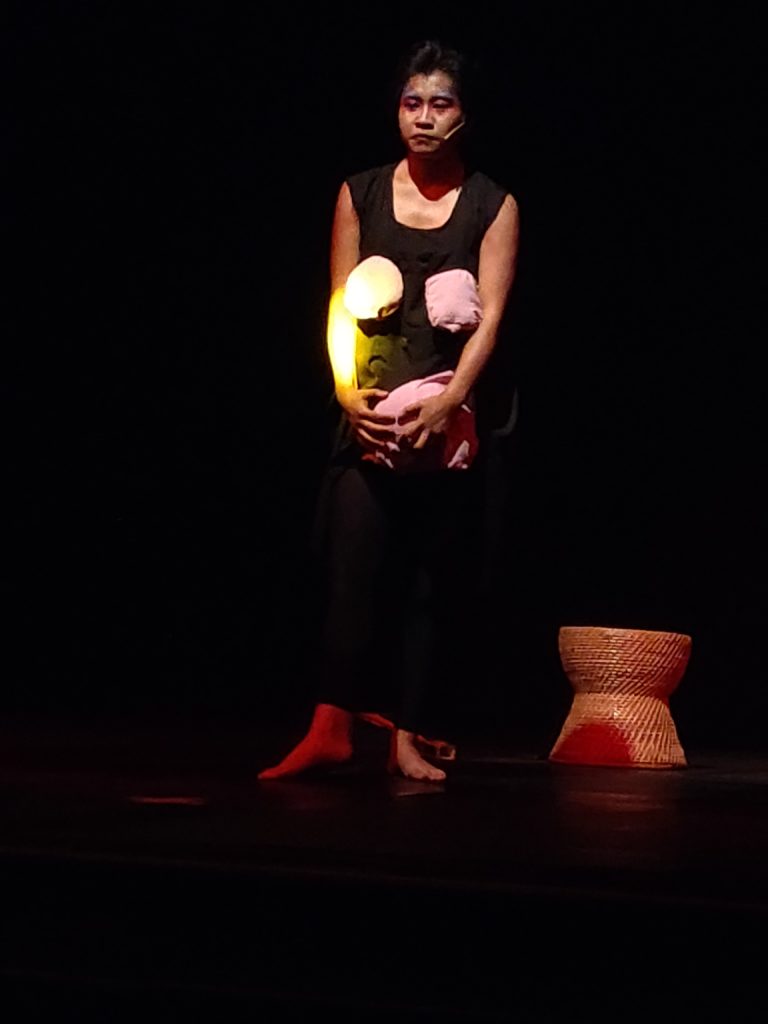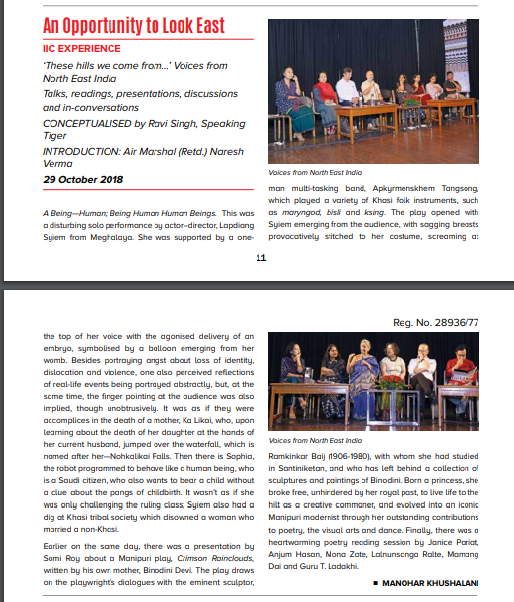An Opportunity to Look East – IIC Experience | Manohar Khushalani

Condensed Version Published in IIC Diary Nov - Dec 2018
During the North East fest on Monday, the 29th October, 2018, at the Fountain Lawns, the audience was confronted by a disturbing solo performance by actor director, Lapdiang Syiem from Meghalaya, called A Being — Human; Being Human Human Beings. She was supported by a one man multitasking band, Apkyrmenskhem Tangsong, who played a variety of Khasi folk instruments, such as; maryngod, bisli & ksing. The play opened with Syiem emerging from the audience, with sagging breasts provocatively stitched to her costume, challenging at the top of her voice with the agonized delivery of an embryo symbolized by a balloon emerging from her womb. Later many balloons were burst on stage, as if they were marginalised humans whose survival didn’t matter. Besides portraying angst about loss of identity, dislocation and violence, one also perceived reflections of real life events being portrayed abstractly, but, at the same time, the finger pointing at the audience was also implied, though unobtrusively. It was as if they were accomplices in the death of a mother, Ka Likai, who upon learning about the death of her daughter in hands of her current husband, jumped over the water fall, which is named after her – Nohkalikai Falls. Then there is Sophia, the robot programmed to behave like a human being, who is a Saudi citizen, who also wants to bear a child without having a clue about the pangs of child birth. It wasn’t as if she was only challenging the ruling class, Syiem also had a dig at the Khasi tribal society which disowned a woman who married a non Khasi.
Earlier on the same day we had a presentation by Soli Roy about a Manipuri play, Crimson Rainclouds, written by his own mother, Sahitya Akademi Awardee, Binodini Devi (1922–2011). The play draws on the playwright’s dialogues with the eminent sculptor, Ramkinkar Baij (1906-1980), with whom she studied in Santiniketan, and who has left behind a big collection of sculptures and paintings of Binodini. Born a princess, she broke free unhindered by her royal past, to live life to the hilt as a creative commoner, and evolved into an iconic Manipuri modernist, through her outstanding contributions to poetry, visual arts and dance. Collaborating with filmmaker Aribam Syam Sharma, she also scripted his award winning films.
There was a heartwarming poetry reading session by following poets of the North East. Anice Pariat, Anjum Hasan, Mona Zote, Lalnunsanga Ralte, Mamang Dai Guru & T. Ladakhi However all poems read out at the event were in English, some wrote only in that language, others did write also in their mother tongue, but chose to read out only the English ones. Due to lack of space I share a poem only by T. Ladakhi
Memory
Separated by twelve years,
both born in the year of the snake.
She was the youngest child
and he the eldest son.
My uncle is the head of his clan.
Soon after my mother died
just shy of her 53rd birthday,
my uncle stops imprinting his memory
as if it did not matter anymore.
I remember my mother’s tender story,
how he carried her as a fading child on his back
trekking for several days to “Phur Chachu”-*
invoking the gods with his fierce love-
a brother grows taller and taller in a little girl’s eyes.
I meet him now and then since twenty two years ,
drooped are his broad shoulders,
gone is his ruddy vigour.
He bothers me for some tobacco and rum
this time I carry none.
Memory and awareness are the materials of the mind,
but time is a fabrication.
Amidst obviously embarrassed cousins,
he inquires who I am and to state my purpose of visit.
I tell him I’m his kid sister’s son,
he looks at me most incredulous,
my grey beard finally pulling the rug under him.
He beckons me to his side and declares
that I’m a most disgusting low-life liar.
* the holy hot water spring in South-Sikkim, India popular among pilgrims seeking cures.

IIC EXPERIENCE: A FESTIVAL OF THE ARTS, 2018 Special Issue